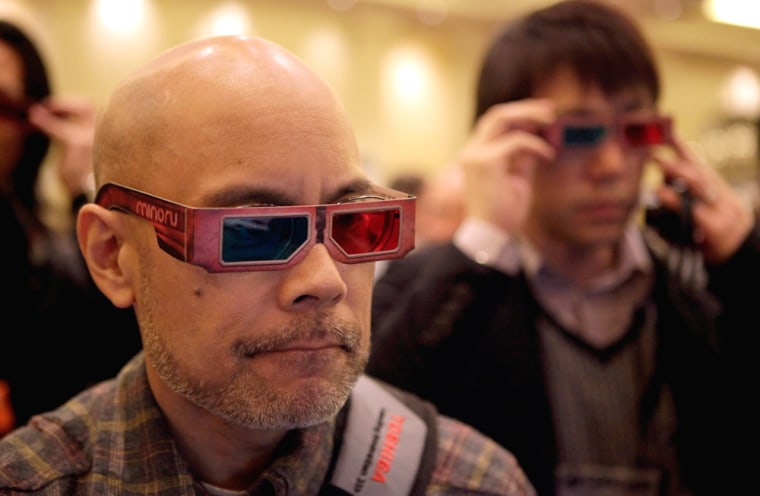Bill Gates isn’t at the International Consumer Electronics Show.
Steve Jobs isn’t at Macworld. In fact, Apple Inc. is leaving the trade show for good after this year.
The absences of the titans of personal computing at the most important conventions in the industry are evidence that, one way or another, 2009 will represent a turning point for the consumer technology.
The financial crisis has struck a blow, with layoffs and plummeting stock prices. Sales across the board are expected to slow significantly this year as consumers cut back on buying non-essential items — in the past year, consumer confidence in the technology industry has fallen by 13 percent as measured by the Consumer Electronics Association-CNET Index of Consumer Technology Expectations.
“Our world, our nation and our industry face some big challenges ... that will likely be with us for quite some time, quite a while, while this recession ripples across the globe,” Steve Ballmer, chairman and chief executive of Microsoft Inc., said in the opening keynote address Wednesday night at CES. (Msnbc.com is a joint venture of Microsoft and NBC News.)
The Consumer Electronics Association, the organizer of CES, projected that consumer spending on electronics would rise by less than 5 percent this year — down significantly from 13 percent growth in 2008. Worldwide, mobile phone sales are expected to fall from their usual double-digit growth to just 2.1 percent this year, the CEA said. Growth in television sales will fall from 10.5 percent last year to 2.6 percent.
“Discretionary spending has turned negative in the last few months,” said Shawn G. DuBravac, the CEA’s chief economic analyst. “Consumers are looking at things with a ‘what can I cut out?’ point of view.”
“2009 will remain a very bad year,” he said.
Fewer products for fewer buyers
The impact can easily be seen in Las Vegas, where the number of exhibitors at CES is down 10 percent from last year and where 10,000 fewer people are in attendance, and at Macworld, where registrations were down by 20 percent. Executives for major tech companies pummeled by the recession have better things to do than to party at a giant trade show.
Shares of Research in Motion (the Blackberry people) and Sun Microsystems are down 60 percent in less than a year. Shares of Motorola, which has cut executives’ pay by 25 percent and is freezing its pension program, fell below $5 this week, down by nearly three-quarters over the past year.
And as technologies mature, they leave tech companies to chase reluctant consumers with incremental advancements on existing products. There are virtually no splashy new technologies or game-changing products on offer either at CES or at Macworld.
The big news from Macworld, for instance, was not any new iPhone, usually unveiled by Jobs himself with a casual “one more thing” at the end of his annual address. Instead, it was a bookkeeping overhaul in prices and digital rights management for songs on iTunes — a welcome change for music lovers, for sure, but hardly the Next Big Thing in Apple technology.
That news was left for Apple Inc.’s senior vice president, Phil Schiller, to announce. Jobs, who is recovering from what he says is a hormone imbalance, wasn’t there. And he won’t be there next year, because Apple is abandoning Macworld after this year.
Gates, whose annual keynote address was a highlight of CES for nearly 15 years, isn’t here in Las Vegas. His place was taken by Ballmer, his successor at Microsoft.
The preternaturally optimistic Ballmer characteristically saw the tough times as “a bigger opportunity to make a difference in people’s lives.” But even he acknowledged that consumers were “struggling to make every dollar count and looking at alternatives carefully.”
It’s good to be wireless or green
The news was in keeping with the subdued tone at this year’s CES, where the marquee announcements are not about breakthroughs in new technologies. Instead, they are about advancements in making the products we already have work better: sharper and thinner high-definition televisions; cheaper Blu-ray DVD components; faster desktop computers; faster netbooks with bigger screens. And everyone is working to make your current devices talk to one another wirelessly.
In fact, the unofficial theme at CES isn’t “breakthrough” or “faster” or anything to do with leaps in core technologies. The watchword this year is “green”; scores of companies are emphasizing products that use less power and are more easily recyclable.
Even Ballmer had little to announce in his debut keynote. He made a big deal of revealing that a beta version of Microsoft’s next generation of its core operating system, dubbed Windows 7, would be available for downloading by home users beginning Friday — news that had been widely expected.
But Windows 7 is not an essentially new operating system, like Windows Vista or Windows XP before it. It is an upgrade of the widely unpopular Vista system designed in large part, as Ballmer himself put it, to “get it right.”
